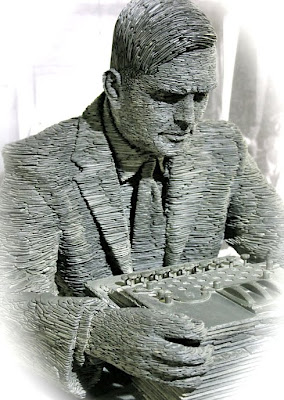Alan Turing, the father of modern computing, has been commemorated in a special interactive Google doodle that simulates the theoretical Turing machine that Turing proposed in a mathematical paper.
The doodle allows users to try their hand at programming and replaying the results.
It is clear that Google revers Turing and its staff feels they owe a debt to Turing. Last year Google helped Bletchley Park raise funds to purchase Turing’s papers so they could be preserved for public display.
Turing’s inventions are ranked among the most important intellectual breakthroughs of the 20th century and his contribution to computer science came through the formalisation of the concepts of algorithms and computation. As such he is considered the father of computer science and artificial intelligence.
Born on 23 June 1912 Turing was a mathematical prodigy at a time when there was a higher emphasis on the classics. Nevertheless at 16 he encountered Albert Einstein’s work and extrapolated Einstein’s questioning of Newton’s laws of motion.
An academic career beckoned and he graduated from King’s College with first-class honors in Mathematics. At 22 he was elected a fellow at King’s College.
All roads lead back to Turing
During World War II he worked at Bletchley Park and headed Hut 8, the section responsible for cracking German ciphers, leading to hacking the Nazi’s Enigma Machine.
After the war he worked at the National Physics Laboratory where he created one of the first designs for a stored program computer, the ACE.
However, despite Turing’s mathematical and scientific prowess he was a victim of his times and was discriminated against on the grounds of his homosexuality which was illegal in the UK at the time.
He was prosecuted in 1952 and had to undergo chemical castration. Just before his 42nd birthday Turing committed suicide by taking poison.
In 2009 the former British Prime Minister Gordon Brown made an official public apology on behalf of the British government for the way that Turing was treated after the war.
Today, Turing would have reached 100 years of age and it is incredible to think in the intervening 58 years since he left this world so much has happened in terms of computing, from the personal computer to the internet and the smartphones we all carry and take for granted today.
“Considering the role computers now play in everyday life, it’s clear Turing’s inventions rank among the most important intellectual breakthroughs of the 20th century. In the evolution of computing, all paths trace back to Turing,” Andrew Eland, Engineering Director, Google UK wrote in the official Google blog.
“That’s why Turing is a hero to so many Google engineers, and why we’re so proud to help commemorate and preserve his legacy.”
